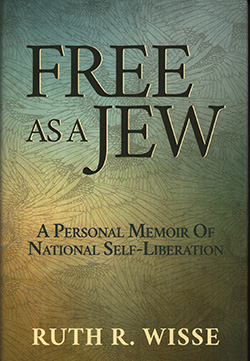Free as a Jew: A Personal Memoir of National Self-Liberation by Ruth R. Wisse; New York: Post Hill Press (c) 2021; ISBN 9781642-939705; 359 pages; $28.

 SAN DIEGO — I will freely admit that I am unequal to a large portion of this book. Having not read some of the works that author Ruth R. Wisse subjects to her literary criticism, I have no idea whatsoever if her opinions are on target or off the mark. I grew up in the tradition of journalism, working initially for the Associated Press, where I learned that readers of your stories need to be provided background information because often, they “are just one day deep” in the issue under discussion. Further, I was taught to write for the “Kansas City milkman,” who was presumed to have no more than a sixth-grade education.
SAN DIEGO — I will freely admit that I am unequal to a large portion of this book. Having not read some of the works that author Ruth R. Wisse subjects to her literary criticism, I have no idea whatsoever if her opinions are on target or off the mark. I grew up in the tradition of journalism, working initially for the Associated Press, where I learned that readers of your stories need to be provided background information because often, they “are just one day deep” in the issue under discussion. Further, I was taught to write for the “Kansas City milkman,” who was presumed to have no more than a sixth-grade education.
Professor Wisse follows none of those journalistic traditions. If her readers lack the background to comprehend the point she is making, well, that’s on them. If her writing seems too erudite for mass consumption, she wasn’t writing for the hoi polloi anyway. Wisse founded the Jewish Studies Department at McGill University in Montreal, Canada, and later accepted from Harvard University a professorship in Yiddish and Comparative Literature. Her reading, writing, and scholarship are extensive.
Wisse also has a reputation as a political commentator, particularly on matters affecting the Jewish community. Her columns in Commentary magazine were adored by political conservatives and reviled by political liberals. Uncowed by her opponents, she has taken positions against the Middle East peacemaking process that started with Oslo and which continues to enamor high-ranking members of President Biden’s administration. Israel had no business setting up Yasser Arafat (and his successor Mahmoud Abbas) as head of the Palestinian Authority, she argued. In doing so, it enthroned tyranny and terrorism.
Wisse has little patience for those Jews who profess pro-Palestinian, anti-Israel sentiments. In her view, they are attempting to purchase acceptance from the Jew-haters by aligning with their cause, no matter that this is hurtful, even dangerous, to their family of co-religionists. If she were using Christian metaphors, she might compare them all to Judas, the disciple who sold out Jesus to the Roman authorities.
At Harvard University, which is a hotbed of “progressive” anti-Israel sentiment–as are many universities–Wisse was always controversial, often being called a “racist” for her unabashed Zionist views. She made no apologies, even reveled in the distinction. She is not bound by current political norms among academics; no, she is free as a Jew.
Throughout my journalistic career, I have covered politics, dealing with Republicans, Democrats, independents, third party advocates, and idealogues of all persuasions both in the United States and in Israel (although not in Canada). I am used to accepting most people as my fellow human beings, all of them with lessons to teach me, regardless of their political affiliations.
For all of Wisse’s determinedly uncompromising stands, there is a surprise within her memoir. You might expect someone with such pronounced views to be arrogant, maybe even insufferable. Not so Wisse; there is a charming stream of personal modesty that flows through the book. Although I found myself struggling with some of her concepts, I nevertheless found Wisse quite likable.
*
Donald H. Harrison is editor of San Diego Jewish World. He may be contacted via donald.harrison@sdjewishworld.com